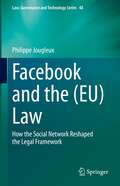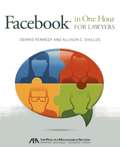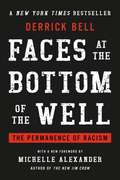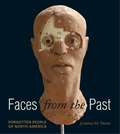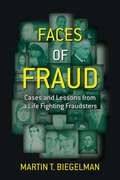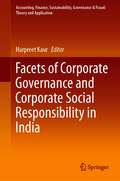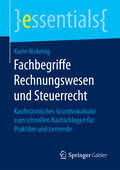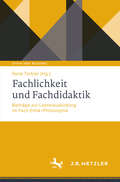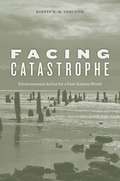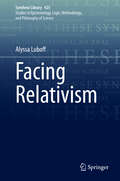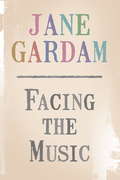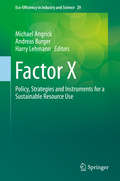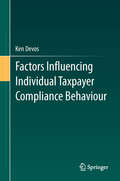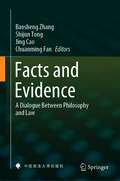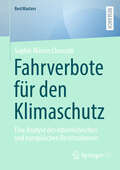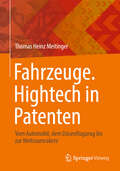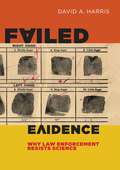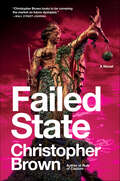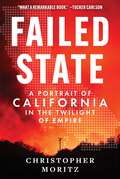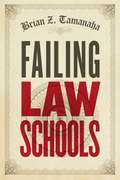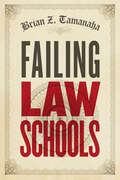- Table View
- List View
Facebook and the: How the Social Network Reshaped the Legal Framework (Law, Governance and Technology Series #48)
by Philippe JougleuxThe past two decades have seen a radical change in the online landscape with the emergence of GAFAM (Google, Amazon, Facebook, Apple and Microsoft). Facebook, specifically, has acquired a unique monopoly position among social media, and is part of the digital lives of billions of users. A mutual influence between Facebook and the legal framework has gradually emerged, as EU legislators and judges are on the one hand forced to accept the reality of new, widespread behaviors and practices and on the other have constructed a legal framework that imposes limits and rules on the use of the social network.This book offers a unique perspective on this relationship, exploring the various activities and services proposed by Facebook and discussing the attendant legal issues. Accordingly, questions concerning the GDPR, its principles, rights and obligations are in the center of the discussions. However, the book does not limit its scope to data protection: Facebook has also greatly contributed to a liberalization and democratization of speech. In accordance, the classic principles of media law must be revisited, adapted or suitably enforced on the platform. Intellectual property law governs what is owned and by whom, no matter whether raw data or informational goods are concerned. Frameworks on hate speech and fake news are the result of coregulation principles of governance, whereas defamation jurisprudence continues to evolve, considering the consequences of merely “liking” certain content. The economic model of advertising is also governed by strict rules. Above all, Facebook is currently caught in a dilemma of substantial interest for society as a whole: is it a neutral online intermediary, i.e., merely a passive player on the Internet, or is it transforming against its will into an editorial service? In conclusion, the book has a dual purpose. First, it proposes a global and practical approach to the EU legal framework on Facebook. Second, it explores the current limits and the ongoing transformation of EU Internet law as it steadily adapts to life in the new digital world.
Facebook in One Hour for Lawyers
by Dennis Kennedy Allison C. ShieldsMany lawyers use Facebook(r), the world's most popular social networking platform, to communicate with friends and family across the globe. But lawyers are missing a major opportunity if they do not consider the business possibilities of their Facebook(r) accounts. With a few simple steps, lawyers can harness Facebook(r) to market their services, grow their practices, and expand their legal network--all by using the same methods they already use to communicate with friends and family. Facebook(r) in One Hour for Lawyers will show any attorney--from Facebook(r) novices to advanced users--how to use this powerful tool for both professional and personal purposes. In just one hour, you will learn to: Set up a Facebook(r) account Optimize privacy and other settings Create a profile and manage your timeline Find, organize, and manage friends Use Facebook(r) search and navigation Participate on Facebook(r) with updates, comments, likes, and timelines Send messages, join groups, and subscribe to feeds Establish a business page Monitor your Facebook(r) network Develop a Facebook(r) strategy to grow your legal network"
Faces at the Bottom of the Well: The Permanence of Racism
by Michelle Alexander Derrick BellThe classic work on American racism and the struggle for racial justiceIn Faces at the Bottom of the Well, civil rights activist and legal scholar Derrick Bell uses allegory and historical example to argue that racism is an integral and permanent part of American society. African American struggles for equality are doomed to fail so long as the majority of whites do not see their own well-being threatened by the status quo. Bell calls on African Americans to face up to this unhappy truth and abandon a misplaced faith in inevitable progress. Only then will blacks, and those whites who join with them, be in a position to create viable strategies to alleviate the burdens of racism. "Freed of the stifling rigidity of relying unthinkingly on the slogan 'we shall overcome,'" he writes, "we are impelled both to live each day more fully and to examine critically the actual effectiveness of traditional civil rights remedies."With a new foreword by Michelle Alexander, Faces at the Bottom of the Well is urgent and essential reading on the problem of racism in America.
Faces from the Past: Forgotten People of North America
by James M. DeemWhen skeletons from centuries ago are discovered, scientists want to study them to discover information about the lives , deaths , time and place in history of these people so that the nameless, unknown people can be brought back to life, remembered, and honoured.
Faces of Fraud
by Martin T. BiegelmanThe ultimate tool for understanding, investigating and preventing fraudFraud is an evil with a life of its own that leaves a financial, repetitional, and emotional toll on its victims. While monumental scandals, such as Enron, WorldCom, and Madoff's Ponzi scheme make the front pages, fraud is a daily occurrence impacting companies and individuals alike. Faces of Fraud reveals must-know characteristics of fraudsters and the skills needed to outwit them. Recognized Fraud Fighting Expert Martin Biegelman draws from his 40 years of experience fighting fraud to profile not only the key traits fraudsters share, but also the qualities fraud examiners must possess to be successful.Each chapter contains stories from actual cases that the author investigatedProfiles the must-know characteristics of fraudsters and the skills you'll need to outwit themReveals the traits of accomplished fraud examinersExplores the best practices in fraud detection, investigation and prevention to cultivate in order to maximize successWritten by fraud fighting expert Martin T. BiegelmanAlthough fraud will never be completely eradicated, there is much that can be done to reduce the number and size of frauds that take place in any organization. Boiling down the key lessons the author has culled from his long career, Faces of Fraud entertains and informs with stories from real cases the author investigated over his long career, and imparts useful tips you can start using right away in the fraud examination field.
Facets of Corporate Governance and Corporate Social Responsibility in India (Accounting, Finance, Sustainability, Governance & Fraud: Theory and Application)
by Harpreet KaurThis book focuses on the legal and social aspects of corporate governance through doctrinal and empirical research papers presented at the 9th International Conference on Governance Fraud Ethics and Social Responsibility held at National Law University Delhi in 2018. The papers encompass the internal and external factors that affect the interests of a company’s stakeholders, including shareholders, customers, suppliers, government regulators and management, and several other important players. The book provides better clarity on the concept of corporate governance and how it is intertwined with factors such as sustainability, social responsibility and the role of government, taxation and audit, and shareholder engagement.
Facetten des römischen Erbrechts
by Jan Dirk HarkeIn diesem Band sind die Schriftfassungen der Beiträge einer Tagung zum römischen Erbrecht gesammelt. Sie befassen sich mit der Testamentsauslegung, der testamentsrechtlichen Benachteiligung römischer Frauen, dem Privileg für die Testamente von Kriegsgefangenen, der Überleitung von Vermächtnissen auf die Erben der Vermächtnisnehmer, Systembezügen von Entscheidungen zum Vermächtnisrecht sowie mit dem schenkweisen Erlass von Todes wegen unter dem Blickwinkel historischer Rechtsvergleichung.
Fachbegriffe Rechnungswesen und Steuerrecht: Kaufmännisches Grundvokabular zum schnellen Nachschlagen für Praktiker und Lernende (essentials)
by Karin NickenigKarin Nickenig befasst sich in diesem essential in aller K#65533;rze mit den wesentlichen Fachbegriffen aus der Buchf#65533;hrung und Kostenrechnung (Rechnungswesen), sowie einschl#65533;gigem Fachvokabular aus dem Steuerrecht (insb. Einkommen-, Umsatz- und Gewerbesteuer). Der Leser erh#65533;lt mit Hilfe dieses praxisorientierten kleinen Nachschlagewerks einen einfachen, dennoch fundierten Einstieg in relevante Begriffsdefinitionen, welche zum beruflichen Alltag z. B. eines kaufm#65533;nnischen Angestellten oder Unternehmers geh#65533;ren. Die Anordnung in alphabetischer Reihenfolge erleichtert das Auffinden der Begriffe im Praxisalltag ,,auf die Schnelle".
Fachlichkeit und Fachdidaktik: Beiträge zur Lehrerausbildung im Fach Ethik/Philosophie (Ethik und Bildung)
by René TorklerDer Band versammelt Beiträge zum Verhältnis von Fachdidaktik und Lehrerausbildung im Fach Ethik/Philosophie. Dabei kommen Perspektiven aus mehreren deutschen Bundesländern, Österreich sowie der Schweiz zu Wort und auch Unterschiede zwischen verschiedenen Schulformen werden in den Blick genommen. Inhaltlich befassen sich die Beiträge vor allem mit der Bedeutung der Fachlichkeit für die philosophisch-ethische Lehrerbildung, dem Verhältnis von philosophischer und fachdidaktischer Reflexion sowie der Rolle von Empirie und Wissenschaft für die fachdidaktische Ausbildung von Lehrerinnen und Lehrern.
Facing Catastrophe: Environmental Action for a Post-Katrina World
by Robert R. VerchickAs Hurricane Katrina vividly revealed, disaster policy in the United States is broken and needs reform. What can we learn from past disasters—storms, floods, earthquakes, tsunamis, landslides, and wildfires—about preparing for and responding to future catastrophes? How can these lessons be applied in a future threatened by climate change? In this bold contribution to environmental law, Robert Verchick argues for a new perspective on disaster law that is based on the principles of environmental protection. His prescription boils down to three simple commands: Go Green, Be Fair, and Keep Safe. “Going green” means minimizing exposure to hazards by preserving natural buffers and integrating those buffers into artificial systems like levees or seawalls. “Being fair” means looking after public health, safety, and the environment without increasing personal and social vulnerabilities. “Keeping safe” means a more cautionary approach when confronting disaster risks. Verchick argues that government must assume a stronger regulatory role in managing natural infrastructure, distributional fairness, and public risk. He proposes changes to the federal statutes governing environmental impact assessments, wetlands development, air emissions, and flood control, among others. Making a strong case for more transparent governmental decision-making, Verchick offers a new vision of disaster law for the next generation.
Facing Evil
by John KekesArguing that the prevalence of evil presents a fundamental problem for our secular sensibility, John Kekes develops a conception of character-morality as a response. He shows that the main sources of evil are habitual, unchosen actions produced by our character defects and that we can increase our control over the evil we cause by cultivating a reflective temper.
Facing Relativism (Synthese Library #425)
by Alyssa LuboffThis book tackles the difficult task of defending relativism in the age of science. It succeeds where others have failed by combining the rigor of analytic philosophy with the first-hand insights of anthropological experience. Typically, an anthropologist’s work on relativism offers rich examples of cultural diversity, but lacks philosophical rigor, while a philosopher’s work on relativism offers rigorous argumentation, but lacks rich anthropological examples. Facing Relativism, written by a North American philosopher who lived in the Ecuadorian rainforest, does both.Relativism at a global scale is a view that our claims about the world, both theoretical and practical, are evaluable only relative to a context shaped by factors such as culture, history, language, and environment – or, “a way of life.” It can be at once intuitive and disturbing. While we might expect a way of life to exert some influence on our claims, relativism seems to move to the overly strong conclusion that all of our claims about what is true or good must merely be expressions of cultural bias. It easily opens itself to a host of charges, including paradox and self-contradiction.Facing Relativism argues that such problems arise largely from a failure to situate the view within the context that has, throughout its long history, been its inspiration: the experience – whether through literature, the imagination, or direct anthropological contact – of deeply engaging with a very different way of life. By starting with a careful analysis of the experience of deep engagement, this book shows that relativism is neither as incoherent nor as alarming as we tend to think. In fact, it might just offer the tools we need to face these times of global crisis and change.Alyssa Luboff has produced an exceptional defense of a cultural relativism that recognizes how the epistemic and the ethical intertwine in a way of life. Drawing from her deep engagement over many years with the Chachi and traditional Afro-Ecuadorian people, she provides vivid and compelling examples of how one can come to understand another way of life as well-reasoned, coherent, and integrated, as challenging to one’s own commitments at the same time that one challenges it. Luboff combines her deep engagement with command of the relevant philosophical and anthropological literature. She presents the major arguments against relativism in a sympathetic and generous way, and carefully responds with a sophisticated relativism that acknowledges how the world resists and responds to different conceptual shapings of it. This book is beautifully written and will engage both the academic specialist and the intelligent general reader. – David Wong, Duke UniversityBy the time her brilliant faceoff is over, philosophical relativism will never again be seen as a straw man. – Richard A. Shweder, University of ChicagoThis book will interest readers who seek an astute account of how the pursuit of “truth” – whether relative or absolute – enters into practices of power. Luboff ’s treatment is impressive. – Michael Krausz, Bryn Mawr College and Linacre College, Oxford University
Facing the Music
by Jane GardamA delightful short story from Jane Gardam, revisting that Titan of the Hong Kong law courts, Edward Feathers (known to many as Old Filth) in the days after he loses his beloved wife, Betty.
Facing the Music
by Jane GardamA delightful short story from Jane Gardam, revisting that Titan of the Hong Kong law courts, Edward Feathers (known to many as Old Filth) in the days after he loses his beloved wife, Betty.
Fact-Finding Before the International Court of Justice
by Devaney James GerardFact-Finding before the International Court of Justice examines a number of significant recent criticisms of the way in which the ICJ deals with facts. The book takes the position that such criticisms are warranted and that the ICJ's current approach to fact-finding falls short of adequacy, both in cases involving abundant, particularly complex or technical facts, and in those involving a scarcity of facts. The author skilfully examines how other courts such as the WTO and inter-State arbitrations conduct fact-finding and makes a number of select proposals for reform, enabling the ICJ to address some of the current weaknesses in its approach. The proposals includes, but are not limited to, the development of a power to compel the disclosure of information, greater use of provisional measures, and a clear strategy for the use of expert evidence.
Factor X
by Harry Lehmann Andreas Burger Michael AngrickFactor X: Re-source--Designing the Recycling Society explores the role of recycling in efforts to achieve the sustainable world envisioned in the Federal Environment Ministry's Resource Efficiency Programme, known as ProgRess. The chapters build a roadmap to a Recycling Society in which the decoupling of resource consumption and economic growth is accomplished.
Factors Influencing Individual Taxpayer Compliance Behaviour
by Ken DevosThis volume provides a comprehensive analysis of why taxpayers behave the way they do. It reveals the motivations for why some taxpayers comply with the law while others choose not to comply. Given the current global financial climate there is a need for governments worldwide to increase their revenue collections via improving taxpayer compliance. Research into what shapes and influences taxpayer behavior is critical in that any marginal improvement in understanding and dealing with this behavior can potentially have a dramatic impact upon government revenue. Based on Australian data derived from the data bases of the Australian Taxation Office as an example, this book presents findings that provide lessons for tax systems around the world. Regardless of the type of tax system in place, taxpayers of all nationalities are concerned about how their tax authorities deal with non-compliance and in particular how the tax authorities go about encouraging compliance and ensuring a fair tax system for all. The book presents empirical evidence concerning taxpayer compliance behavior with particular attention being drawn to the moral values of taxpayers, the perceived fairness of the tax system and the deterrent measures undertaken by revenue authorities which influence that behavior. Other issues examined include the degree to which tax penalties operate as an effective deterrent to curbing behavior and how taxpayers' level of general tax knowledge and awareness also impacts upon their actions.
Facts and Evidence: A Dialogue Between Philosophy and Law
by Jing Cao Baosheng Zhang Shijun Tong Chuanming FanThis book presents an in-depth discussion on two concepts from the field of philosophy and law, in order to improve our understanding of the relation between “fact” and “evidence” in judicial process. Since fact-finding is a difficult task for judges, proof by evidence has been devised to help them access the truth. However, in the process of judicial fact-finding, there is always a gap between fact and truth. This book covers a wide range of topics, from reflections on the concept of “fact,” “evidence” and “fact-finding” in the field of philosophy and law to individual case studies. As such it is a useful reference resource on the continuing research on the judicial proof process for students and scholars.
Fahrverbote für den Klimaschutz: Eine Analyse des österreichischen und europäischen Rechtsrahmens (BestMasters)
by Sophie Manon ChourabiDer Mobilitäts- und Verkehrssektor stellt eine tragende Säule der Unionspolitik dar und ist als integraler Bestandteil für das Funktionieren der europäischen Wirtschaft zu betrachten. Rund ein Viertel aller Treibhausgasemissionen der Europäischen Union entfallen auf den Verkehrssektor. Die Mitgliedstaaten sehen sich daher mit der Herausforderung konfrontiert, die im Verkehrssektor entstehenden Treibhausgasemissionen beträchtlich zu reduzieren. Maßnahmen wie Fahrverbote und Verkehrsbeschränkungen können eine wesentliche und effektive Maßnahme zur Reduktion von Treibhausgasemissionen darstellen, wobei einige Städte bereits eine Vorreiterrolle hinsichtlich mobilitätsbezogener Maßnahmen einnehmen. Während in mehreren europäischen Städten längst Fahrverbote für Kfz zur Verbesserung der Luftqualität bestehen, sind keine Fahrverbote mit dem vorrangigen Ziel der Reduktion verkehrsbedingter Treibhausgasemissionen auszumachen. In dem vorliegenden Werk wird aus (unions-)rechtlicher Perspektive untersucht, inwiefern auf lokaler Ebene örtlich begrenzte Fahrverbotszonen für Fahrzeuge mit Verbrennermotoren als Maßnahme zur Begrenzung verkehrsbedingter Treibhausgasemissionen eingeführt werden können. Die rechtliche Zulässigkeit von Fahrverbotszonen wird dabei im Lichte des einschlägigen Unionsrechts und des innerstaatlichen Rechts betrachtet.
Fahrzeuge. Hightech in Patenten: Vom Automobil, dem Düsenflugzeug bis zur Weltraumrakete
by Thomas Heinz MeitingerDie Entwicklung der Menschheit geht einher mit der Entwicklung von Fortbewegungsmitteln. Den Anfang machte die Fortbewegung mit reiner Muskelkraft, dann folgten Automobile, Schiffe und Schienenfahrzeuge. Mit Flugzeugen wurden die Lüfte erobert und mit Weltraumraketen beginnen die Menschen ihren Planeten zu verlassen und das Weltall zu erkunden. Die zunehmenden Möglichkeiten der Fortbewegung führten zu immer neuen Erkenntnissen und erweiterten das Weltbild der Menschheit. Dieses Fachbuch lässt diese Entwicklung anhand von Patentschriften Revue passieren. Hierdurch wird verständlich, wie sich eine technische Entwicklung ergibt und in welcher Weise die zivilisatorische und gesellschaftliche Entwicklung der Menschheit mit der Fortentwicklung der Technologie zusammenhängt. Nicht zuletzt soll dem geneigten Leser die Möglichkeit geboten werden, ein Interesse und ein Verständnis für Technik zu erwerben.
Failed Evidence: Why Law Enforcement Resists Science
by David A HarrisWith the popularity of crime dramas like CSI focusing on forensic science, and increasing numbers of police and prosecutors making wide-spread use of DNA, high-tech science seems to have become the handmaiden of law enforcement. But this is a myth,asserts law professor and nationally known expert on police profiling David A. Harris. In fact, most of law enforcement does not embrace science—it rejects it instead, resisting it vigorously. The question at the heart of this book is why.»» Eyewitness identifications procedures using simultaneous lineups—showing the witness six persons together,as police have traditionally done—produces a significant number of incorrect identifications.»» Interrogations that include threats of harsh penalties and untruths about the existence of evidence proving the suspect’s guilt significantly increase the prospect of an innocent person confessing falsely.»» Fingerprint matching does not use probability calculations based on collected and standardized data to generate conclusions, but rather human interpretation and judgment.Examiners generally claim a zero rate of error – an untenable claim in the face of publicly known errors by the best examiners in the U.S.Failed Evidence explores the real reasons that police and prosecutors resist scientific change, and it lays out a concrete plan to bring law enforcement into the scientific present. Written in a crisp and engaging style, free of legal and scientific jargon, Failed Evidence will explain to police and prosecutors, political leaders and policy makers, as well as other experts and anyone else who cares about how law enforcement does its job, where we should go from here. Because only if we understand why law enforcement resists science will we be able to break through this resistance and convince police and prosecutors to rely on the best that science has to offer. Justice demands no less.Visit the author's blog here.
Failed State: A Novel (Dystopian Lawyer #2)
by Christopher BrownA Philip K. Dick Award Nominee"The novel is as tense and thrilling as any of Brown's work, and as full of rage and hope. It's a novel that truly reckons with the enormity of both our climate emergency and the system that produced it - a tale of human imperfection and redemption." -- Cory Doctorow, bestselling author of WalkawayIn this second dystopian legal thriller from the author of the acclaimed Rule of Capture and Tropic of Kansas, lawyer Donny Kimoe juggles two intertwined cases whose outcomes will determine the course of America’s future—and his own. In the aftermath of a second American revolution, peace rests on a fragile truce. The old regime has been deposed, but the ex-president has vanished, escaping justice for his crimes. Some believe he is dead. Others fear he is in hiding, gathering forces. As the factions in Washington work to restore order, Donny Kimoe is in court to settle old scores—and pay his own debts come due.Meanwhile, the rebels Donny once defended are exacting their own kind of justice. In the ruins of New Orleans, they are building a green utopia—and kidnapping their defeated adversaries to pay for it. The newest hostage is the young heiress to a fortune made from plundering the country—and the daughter of one of Donny’s oldest friends. In a desperate gambit to save his own skin, Donny switches sides to defend her before the show trial. If he fails, so will the truce, dragging the country back into violence. But by taking the case, he risks his last chance to expose the atrocities of the dictatorship—and being tried for his own crimes against the revolution.To save the future, Donny has to gamble his own. The only way out is to find the evidence that will get both sides back to the table, and secure a more lasting peace. To do that, Donny must betray his clients’ secrets. Including one explosive secret hidden in the ruins, the discovery of which could extinguish the last hope for a better tomorrow—or, if Donny plays it right, keep it burning.
Failed State: A Portrait of California in the Twilight of Empire
by Christopher MoritzCalifornia was once the crown jewel of the American dream: prosperous, innovative, egalitarian, and aspirational. Today, it stands as a dystopian warning of what happens when nihilistic, radical ideology consumes the foundations of governance. In Failed State, Christopher Moritz dissects the unraveling of the Golden State with the precision of a lawyer, the depth of a historian, and the heartbreak of a California native son who has witnessed its collapse firsthand. Through disturbing, relentless detail drawn from whistleblowers, law enforcement insiders, and classified reports, he exposes the corrosive and deadly impact of progressive policies that have prioritized criminals over victims, cartels over citizens, and ideological dogma over law and order. Moritz reveals the architects of this catastrophe: rogue prosecutors bankrolled by anarchist billionaires, open-border zealots who have transformed California into a cartel haven, and policymakers who have gutted public safety in the name of equity. The 2025 Palisades Fire, a man-made disaster, epitomize this descent into chaos. Fire hydrants ran dry while organized looters turned evacuation zones into war zones. Resources were squandered on symbolic virtue-signaling as ordinary citizens were left defenseless in the face of destruction. These failures are not isolated—they are the inevitable result of policies designed to dismantle civic order and empower anarchic forces at the expense of law-abiding Americans. Yet, Failed State is more than an autopsy of California&’s collapse. Drawing on historical parallels—from the Bolshevik Revolution&’s destruction of Christian Russia to the ethnic cleansing of Rhodesia by Mugabe&’s communists—Moritz warns that California&’s crisis is not contained to the Golden State. It is a harbinger for America&’s future if these radical trends metastasize nationwide. His searing analysis reveals the systematic dismantling of civil society and the betrayal of a state&’s duty to its citizens, all in service of an anti-civilization agenda cloaked in the language of progress. Unflinching, provocative, and unapologetically honest, Failed State is a rallying cry for those who refuse to stand by as America&’s most prosperous state spirals into lawlessness and disorder. For those seeking clarity amid chaos, Christopher Moritz delivers a blistering indictment of failed leadership and a warning that the unraveling of California could signal that unraveling of the nation itself.
Failing Law Schools
by Brian Z. TamanahaOn the surface, law schools today are thriving. Enrollments are on the rise, and their resources are often the envy of every other university department. Law professors are among the highest paid and play key roles as public intellectuals, advisers, and government officials. Yet behind the flourishing facade, law schools are failing abjectly. Recent front-page stories have detailed widespread dubious practices, including false reporting of LSAT and GPA scores, misleading placement reports, and the fundamental failure to prepare graduates to enter the profession. Addressing all these problems and more in a ringing critique is renowned legal scholar Brian Z. Tamanaha. Piece by piece, Tamanaha lays out the how and why of the crisis and the likely consequences if the current trend continues. The out-of-pocket cost of obtaining a law degree at many schools now approaches $200,000. The average law school graduate's debt is around $100,000--the highest it has ever been--while the legal job market is the worst in decades, with the scarce jobs offering starting salaries well below what is needed to handle such a debt load. At the heart of the problem, Tamanaha argues, are the economic demands and competitive pressures on law schools--driven by competition over U. S. News and World Report ranking. When paired with a lack of regulatory oversight, the work environment of professors, the limited information available to prospective students, and loan-based tuition financing, the result is a system that is fundamentally unsustainable. Growing concern with the crisis in legal education has led to high-profile coverage in the Wall Street Journal and the New York Times, and many observers expect it soon will be the focus of congressional scrutiny. Bringing to the table his years of experience from within the legal academy, Tamanaha has provided the perfect resource for assessing what's wrong with law schools and figuring out how to fix them.
Failing Law Schools (Chicago Series in Law and Society)
by Brian Z. TamanahaOn the surface, law schools today are thriving. Enrollments are on the rise, and their resources are often the envy of every other university department. Law professors are among the highest paid and play key roles as public intellectuals, advisers, and government officials. Yet behind the flourishing facade, law schools are failing abjectly. Recent front-page stories have detailed widespread dubious practices, including false reporting of LSAT and GPA scores, misleading placement reports, and the fundamental failure to prepare graduates to enter the profession.Addressing all these problems and more in a ringing critique is renowned legal scholar Brian Z. Tamanaha. Piece by piece, Tamanaha lays out the how and why of the crisis and the likely consequences if the current trend continues. The out-of-pocket cost of obtaining a law degree at many schools now approaches $200,000. The average law school graduate’s debt is around $100,000—the highest it has ever been—while the legal job market is the worst in decades, with the scarce jobs offering starting salaries well below what is needed to handle such a debt load. At the heart of the problem, Tamanaha argues, are the economic demands and competitive pressures on law schools—driven by competition over U.S. News and World Report ranking. When paired with a lack of regulatory oversight, the work environment of professors, the limited information available to prospective students, and loan-based tuition financing, the result is a system that is fundamentally unsustainable.Growing concern with the crisis in legal education has led to high-profile coverage in the Wall Street Journal and the New York Times, and many observers expect it soon will be the focus of congressional scrutiny. Bringing to the table his years of experience from within the legal academy, Tamanaha has provided the perfect resource for assessing what’s wrong with law schools and figuring out how to fix them.
